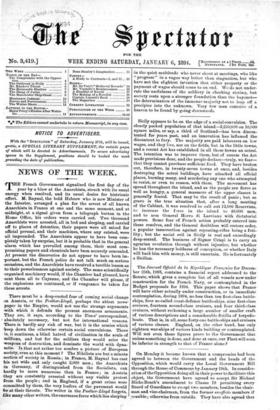Sicily appears to be on the edge of a social
convulsion. The closely packed population of that island-3,250,000 on 10,000 square miles, or say, a third of Scotland—has been discon- tented for years past, and an innovation has inflamed the discontent to fury. The majority are paid labourers on low wages, and they live, not on the fields, but in the little towns, and a recent Act has established in all these towns an octroi. The intention was to improve them, but of course the Act made provisions dear, and the people declare—truly, we fear— that they cannot purchase sufficient food. They have broken out, therefore, in twenty-seven towns at once, and, besides destroying the octroi buildings, have attacked all official places, burning many, and murdering any one who attempted to resist, or even to reason, with them. The movement has spread throughout the island, and as the people are fierce as well as hungry, a general massacre of the upper classes is generally feared. That may be the result of panic ; but so grave is the true situation that, after a long meeting of the Cabinet, it was resolved to call out 12,000 Reservists, to increase the force in the island to 40,000 men, and to arm General Morra di Lavriano with dictatorial powers. Some fear of French action probably entered into these resolves, and the General doubtless will restore order, a popular insurrection against repeating-rifles being a futi- lity ; but the social evil in Sicily is real and exceedingly deep-seated. The business of Signor Crispi is to carry an agrarian revolution through without injustice, but whether he has the necessary boldness of conception, or whether Italy will back him with money, is still uncertain. He is fortunately a Sicilian.










































 Previous page
Previous page